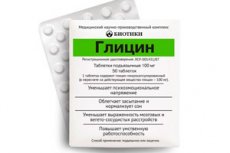新出版物
甘氨酸
阿列克谢·克里文科,医学审稿人
最近審查:04.07.2025
最近審查:04.07.2025

甘氨酸是一种简单的氨基酸化合物,是人体蛋白质的主要组成部分之一。它是蛋白质分子的一部分,参与许多生物过程。
甘氨酸也可用作药物。它常被用作食品添加剂、维生素复合物和药物,以改善睡眠和神经系统,并减轻压力和焦虑。它还可以用于治疗某些疾病,例如失眠、神经官能症,并改善记忆力和认知功能。
適應症 甘氨酸
- 改善睡眠,减少失眠。
- 压力和焦虑。
- 神经症和神经紊乱。
- 增强认知功能,提高记忆力。
- 支持心血管和神经系统。
- 提高注意力和抗压力能力。
發布表單
甘氨酸通常以片剂或胶囊形式口服。剂量可能因制造商和药物的具体品牌而异。
藥效學
- 神经递质作用:甘氨酸是中枢神经系统的主要抑制性神经递质之一。它作为一种抑制性神经递质,抑制神经细胞的兴奋,并有助于降低神经系统的活性。这使得它成为大脑兴奋和抑制平衡的重要调节器。
- 参与蛋白质合成:甘氨酸在蛋白质合成中起着重要作用,是生长、组织修复和维持正常细胞功能所必需的。
- 激活甘氨酸受体:甘氨酸直接作用于甘氨酸受体,增强其活性,降低神经细胞的兴奋性,从而改善大脑抑制性传递系统的功能。
- 参与代谢:甘氨酸参与氨基酸代谢及体内其他重要的代谢过程。
- 抗惊厥作用:甘氨酸具有降低神经系统兴奋性的能力,因此在治疗某些形式的癫痫方面具有潜在用途。
- 参与外周组织信号传导:甘氨酸还在神经和肌肉细胞之间的信号传导中发挥作用,这可能对控制肌肉张力和收缩很重要。
藥代動力學
甘氨酸是一种简单的氨基酸制剂,口服后通常能被人体良好吸收。它能迅速通过胃肠道壁吸收,并迅速分布至全身。甘氨酸在肝脏中代谢,并参与各种生化过程,例如蛋白质和神经递质的合成。未被人体利用的过量甘氨酸主要以尿素的形式经肾脏排出。
劑量和管理
甘氨酸通常以片剂或胶囊形式口服。以下是一般剂量和给药方法:
- 为了缓解压力、改善睡眠,通常建议下午或晚上睡前半小时服用1-2片(或胶囊)甘氨酸。您也可以根据需要在白天服用一片。
- 为了改善认知功能和维持记忆力,可以将剂量增加到每天3-4片,分成几次服用。
- 甘氨酸片通常可溶于口中或用水送服。为了更好地吸收,建议将药片含在舌下直至完全溶解。
在懷孕期間使用 甘氨酸
甘氨酸通常被认为是孕期相对安全的药物。然而,在开始服用任何药物(包括甘氨酸)之前,务必咨询医生,以确保其对您和您的宝宝安全。
禁忌
- 过敏:已知对甘氨酸或其他氨基酸过敏的人可能会对甘氨酸产生过敏反应。因此,在使用甘氨酸前,应确认没有过敏反应。
- 病理性氨基酸病:对于患有氨基酸代谢障碍(例如病理性氨基酸病)的人群,使用甘氨酸可能需要谨慎并接受医疗监督。
- 糖尿病:甘氨酸可能会影响血糖水平,因此糖尿病患者使用时应小心,并可能需要咨询医生。
- 怀孕和哺乳:关于怀孕和哺乳期间使用甘氨酸的安全性的信息有限,因此应与医生讨论其使用。
- 肾功能不全:甘氨酸可能对肾脏有影响,因此肾功能不全患者可能禁用或需要调整剂量。
- 肝功能衰竭:与肾功能衰竭类似,甘氨酸可能会对肝脏产生影响,因此肝功能衰竭患者可能禁用甘氨酸或需要调整剂量。
副作用 甘氨酸
- 罕见的是,可能会出现皮疹、瘙痒或面部和喉咙肿胀等过敏反应。
- 有些人可能会出现恶心、呕吐或胃部不适,尤其是服用超过推荐剂量时。
- 在某些情况下,可能会出现头痛或嗜睡,尤其是在刚开始服用该药物或服用较大剂量时。
過量
- 高甘氨酸血症:服用大剂量甘氨酸会导致血液中甘氨酸水平升高,从而引发高甘氨酸血症。高甘氨酸血症可能伴有各种症状,例如头晕、疲劳、意识模糊、肌肉无力,严重时甚至会出现昏迷和癫痫。
- 降低血压:甘氨酸可能有轻微的降血压作用。过量摄入可能会导致低血压,尤其对于血压本来就低的人群。
- 代谢失衡:过量摄入甘氨酸可能会破坏身体的代谢平衡,尽管这通常与潜在的医疗状况或其他风险因素有关。
- 胃肠道刺激:在极少数情况下,过量的甘氨酸可能会引起胃肠道刺激或功能障碍,表现为腹泻、恶心或呕吐。
- 药物相互作用:过量摄入甘氨酸可能会与某些药物发生相互作用,尤其是用于治疗癫痫或精神疾病的药物。
與其他藥物的相互作用
甘氨酸通常不会与其他药物表现出明显的相互作用。
注意!
為了簡化對信息的理解,本指令使用了藥物 "甘氨酸",並根據藥物的醫療用途官方說明。 使用前請閱讀直接用於藥物的註釋。
描述僅供參考,不適用於自我修復指導。 這種藥物的需求,治療方案的目的,藥物的方法和劑量僅由主治醫師確定。 自我藥療對你的健康有危害。

